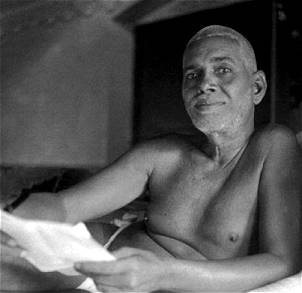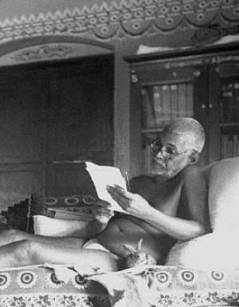|
|
| It was about that time that Chhaganlal Yogi met an old friend on the train who had recently visited Ramanashram. His friend described his visit with great enthusiasm and tried his best to convince Chhaganlal that Ramana Maharshi was an authentic sage. Then his friend gave him a pinch of vibhutti, holy ash from Ramana Maharshi's ashram, but such was his skepticism and cynicism that he let the precious ashes fall from his fingers onto the floor of the train. But in parting his friend gave him a book about the Maharshi which Chhaganlal read and was intrigued by, yet he still felt a great skepticism. Despite his cynicism, he could not get the Maharshi out of his mind. Finally after reading other books and repeatedly writing to the ashram, he decided to visit and find out for himself. |
| At the instance of Sri Muruganar, Shantammal came to the Ashram from Ramnad in 1927. She worked in the kitchen and her devotion to Sri Bhagavan was total. Since she served all with love, everyone at the Ashram loved her, and wherever she stayed people surrounded her to listen to her expositions describing her life with Sri Bhagavan. |
 In 1927, three other ladies and I went to Tiruvannamalai. By that time Bhagavan had come down from the hill and was living in a hut near his mother's samadhi. We rented a place in the town, had a bath and went to see him. He was seated on a cot in a grass-thatched shed. Muruganar was by his side. As soon as I saw him I knew he was God in human form. I bowed to him and said, "The dream of my life has come true. Today I am blessed. Grant that my mind does not trouble me anymore."
In 1927, three other ladies and I went to Tiruvannamalai. By that time Bhagavan had come down from the hill and was living in a hut near his mother's samadhi. We rented a place in the town, had a bath and went to see him. He was seated on a cot in a grass-thatched shed. Muruganar was by his side. As soon as I saw him I knew he was God in human form. I bowed to him and said, "The dream of my life has come true. Today I am blessed. Grant that my mind does not trouble me anymore."
|
| To the poet the Maharshi was an inspired poet; to the scholar, an endless ocean of knowledge; to the Yogi, a supreme adept established in Divine Union. Everyone who approached him with humility and faith, saw something of themselves reflected back, with greater insight and clarity. It is no wonder that those uneducated but spiritually mature women who served him by cooking in the kitchen saw him as a flawless cook who taught the highest wisdom in simple kitchen chores. Sampurnamma diligently served Bhagavan in the kitchen for many years and still lives in Sri Ramanasramam today. She can be seen in the Ashrama with cane in hand, walking slowly with short steps, bent, and wearing a well-used white sari which is draped over the top of her head. When you speak to her, a beautiful smile lights up her face. In reminiscences from an interview, Sampurnamma tells us her story. |
 The next day at noon I was again at Ramanasramam. His midday meal over, Bhagavan was reclining on the sofa and explaining a verse from the Bhagavad Gita to Sri Ramiah Yogi. As no one else was in the hall, I gathered courage and asked: "What is Atma? Is it the limitless ether of space or the awareness that cognizes everything?" Bhagavan replied: "To remain without thinking 'this is Atma' and 'that is Atma', is itself Atma." He looked at me and I felt my mind melt away into nothing. No thought would come, only the feeling of immense, unutterable peace. My doubts were cleared.
The next day at noon I was again at Ramanasramam. His midday meal over, Bhagavan was reclining on the sofa and explaining a verse from the Bhagavad Gita to Sri Ramiah Yogi. As no one else was in the hall, I gathered courage and asked: "What is Atma? Is it the limitless ether of space or the awareness that cognizes everything?" Bhagavan replied: "To remain without thinking 'this is Atma' and 'that is Atma', is itself Atma." He looked at me and I felt my mind melt away into nothing. No thought would come, only the feeling of immense, unutterable peace. My doubts were cleared.
|
|
"I am a beggar, Bhagavan, and all a beggar can offer is her life," I said, and Bhagavan nodded lovingly. Shantammal |
|
Shantammal |
|